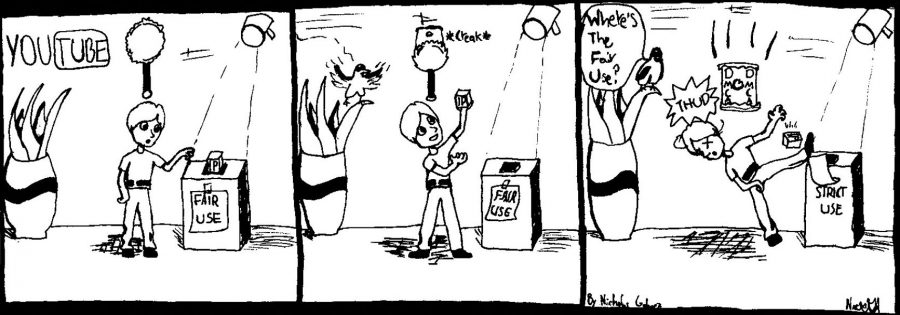Trademarking Phrase: The Fine Bros Controversy
Most of us Stingarees frequent YouTube to watch videos that entertain us when we’re bored, or teach us something new. So many content creators produce on the video streaming site that YouTube has a video for nearly every genre imaginable. To be able to touch the entire YouTube population would be difficult. Despite those odds, Benny and Rafi Fine have managed to do just that, but not in a good way.
If you aren’t familiar, The Fine Brothers are widely known across the YouTube community for their “React” series of videos, where they gather kids, teenagers, adults, and the elderly, to react and comment on different videos and phenomena.
The controversy started when The Fine Brothers began taking steps toward a new business venture called “React World.” While the project had innocent intentions, the decisions related to “React World” and its conception were poorly made.
The fire began to spread when Fine Bros. Entertainment filed a trademark for the word, react, that would give them some control of the “reaction” genre on YouTube. This would hurt thousands of content creators; the operation would actively take all profit gained from any video with the word react in the title and put it in the Fine Brothers’ pocket unless those video makers bought a license.
With the inevitable heat put upon them by the YouTube community, the Fine Brothers finally budged. According to the article titled, “The Fine Brothers’ controversy, explained,” posted on the online news site vox.com, the fiasco was finally put to rest on February 1st when both brothers came out in a public statement claiming they had officially withdrawn 11 trademark requests related to “React World,” including the word “react.”
The fact that the Fine Brothers were able to get that close to trademarking such a common word causes concern. Imagine if they had decided to ignore the public and managed to get the trademark approved. For the YouTube community, a word from their dictionary would be locked up behind a paywall.
In hindsight, this fire was a hot one, but it didn’t burn for too long. If you look back a little further, you’ll also notice that the Fine Brothers’ controversy isn’t the only one of its kind.
The renowned Apple Corporation, creators of the iPod, has attempted in the past to trademark both the terms “podcast” and “pod.” I would consider their attempt to trademark “podcast” as fair since Apple created the iPod, but the word “pod” is a such a general term that it wouldn’t be fair to restrict other sellers on the market from putting that word in their products.
Apple later rephrased their trademark request for “iPodcast” and “iPod.” Zdnet.com, a website dedicated to technology news, posted an article titled, “Apple Trademark Office docs point to REAL reasons for ‘Podcast’ controversy,” that states Apple was successful in their venture to trademark “iPod,” but is still chasing the trademark for “iPodcast.”
Another related controversy is the battle between mobile game developers King and Albert Ransom. Don’t know King? Of course you do, they were the guys behind Candy Crush.
Now, as any self-respecting creator would, King filed a trademark for “Candy Crush Saga” in 2014. All would seem good and well, until game developer Albert Ransom enters the scene.
Now you see, Ransom was fuming when King went in for the trademark. This is because Ransom is a developer of a very similar game titled “CandySwipe.” The fact that King was going to trademark “Candy Crush Saga” would threaten the game that Ransom released a full TWO years before Candy Crush Saga came out.
Albert Ransom fought for the game he made in memory of his past mother, and in mid-2014, King settled with Ransom to keep both games on the market.
An article titled, “Here’s The Scoop On The Latest ‘Candy Crush’ Trademark Saga,” posted on the Huffington Post website, states that King was able to capture the trademark for “Candy Crush Saga” by buying out a related trademark titled “Candy Crusher”.
With that said, our trademarking and copyright system is built to protect intellectual property, not give tyrannical power to corporations. So far, the USPTO (United States Patent and Trademark) hasn’t allowed for an unconstitutional or unrighteous trademark to go through, so you might want to hold your plans for over-throwing the government.
Extra Facts
| There’s a difference between trademarks and copyrights; trademarks mainly govern words, phrases, symbols, and/or designs, while copyrights govern songs, books, movies, and works of art. |
| The Fair Use Act allows individuals and groups to use copyrighted/trademarked material for limited creative purposes. For example, Fair Use allows one to use copyrighted material to comment on, criticize, or parody. |
| The Digital Millennium Copyright Act, short for DMCA, is a law designed to prevent the infringement of copyrighted material on the internet. This includes digital material. |
| #WTFU is a trending hashtag on YouTube, the goal of which is to spread awareness of the many unjustified takedowns of YouTube videos based on the DMCA, and to give more creative freedom to the content creators of YouTube. It stands for, “Where’s The Fair Use?” |


Smitha671 • May 12, 2016 at 12:30 pm
My brother recommended I may like this website. He used to be totally right. This post truly made my day. You can not consider simply how so much time I had spent for this info! Thanks! eecdgeegdebeeekb